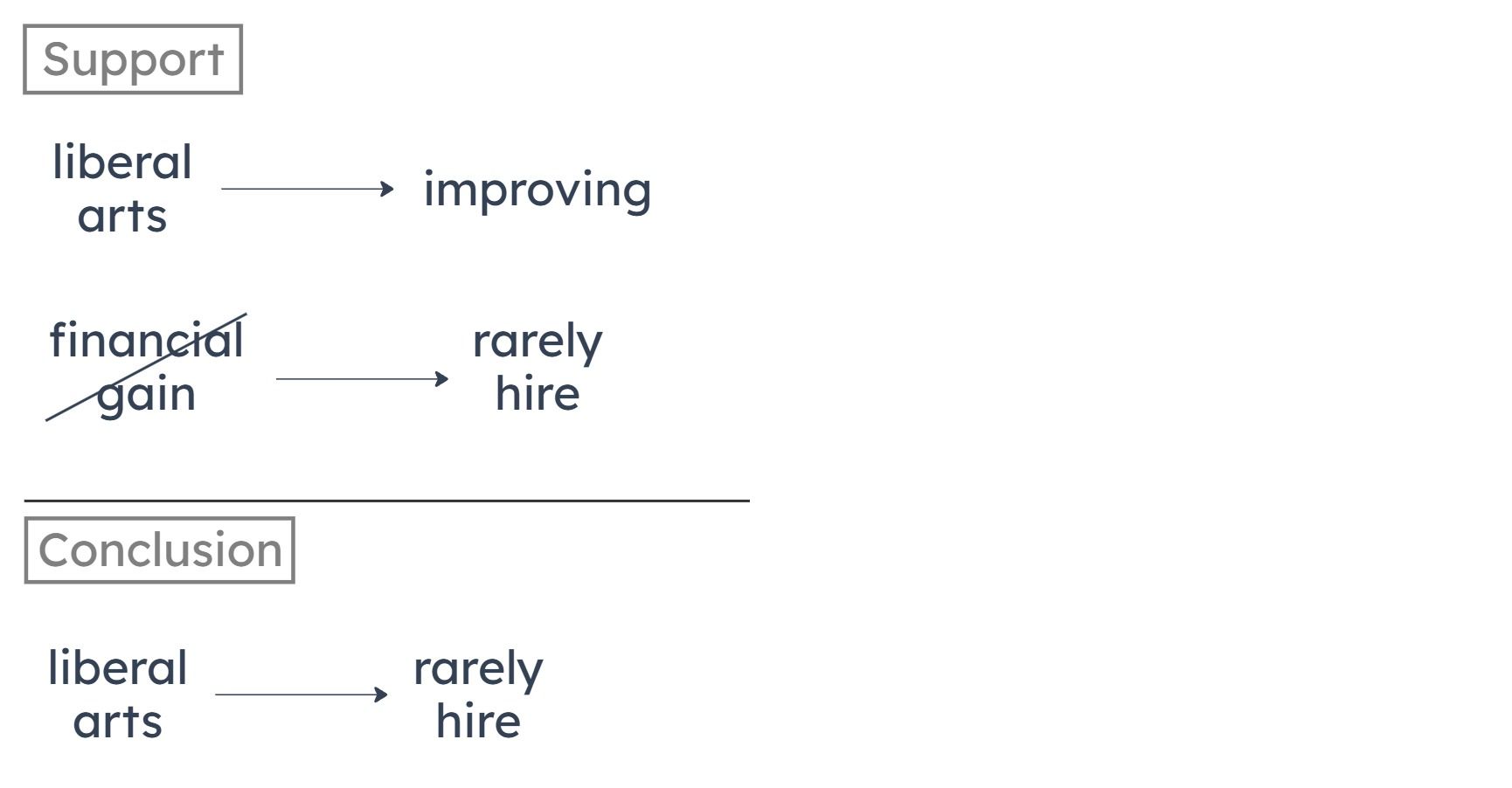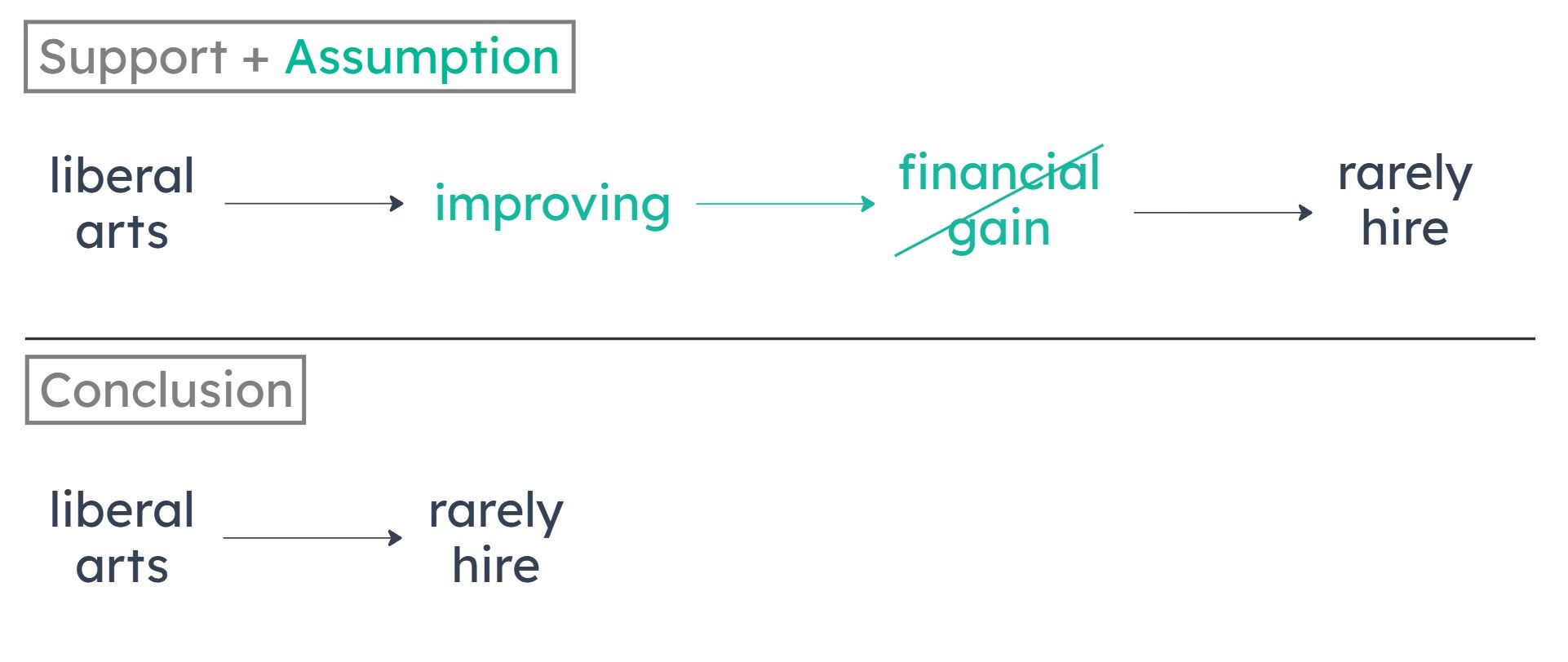Summarize Argument: Phenomenon-Hypothesis
The columnist concludes that Benton is the best bait for anyone who is fishing for trout. Why? Because an independent research firm found it to be the best of the 5 top-selling baits in an experiment. The experiment was conducted by top anglers who fished for speckled trout in a pristine northern stream.
Identify and Describe Flaw
This is the cookie-cutter flaw of making a hasty generalization. The columnist concludes that Benton baits are universally the best for catching trout. But his basis for doing so is an experiment that only measures the five top-selling baits, only tests them in a pristine stream with top anglers, and only attempts to catch speckled trout.
A
The argument overlooks the possibility that some other bait is more successful than any of the five best-selling baits.
The test cited by the columnist only examined the five best-selling baits. A less popular bait could be more effective—which would undermine the conclusion.
B
The argument overlooks the possibility that what works best for expert anglers will not work best for ordinary anglers.
The test cited by the columnist was conducted by expert anglers. If ordinary anglers differ from experts, we can’t be sure the results will apply to them.
C
The argument overlooks the possibility that the relative effectiveness of different baits changes when used in different locations.
The test cited by the columnist only examined a pristine northern stream—results might different in non-pristine, non-northern streams.
D
The argument overlooks the possibility that two best-selling brands of bait may be equally effective.
The columnist does consider this possibility: the test compared the five best-selling brands of bait.
E
The argument overlooks the possibility that baits that work well with a particular variety of fish may not work well with other varieties of that fish.
The test cited by the columnist only examined speckled trout. Bait efficacy might differ for other varieties of trout.
Summarize Argument
The author concludes that a British policy to quarantine imported domesticated animals cannot successfully prevent rabies outbreaks. This is supported by the claim that wild bats are susceptible to rabies and can fly into Britain; furthermore, they can’t be quarantined. This leads to the sub-conclusion that rabies spread by wild bats cannot be controlled by the policy.
Describe Method of Reasoning
The author introduces evidence about bats to show that the scope of the policy fails to address one important cause of rabies, the phenomenon it seeks to prevent. This is used to demonstrate that the policy cannot be effective in its aim of preventing rabies.
A
trying to undermine support for a certain policy by pointing out that factors other than the policy itself could account for the results attributed to that policy
The author does not raise any possible alternative causes for the policy’s results, only concluding that the policy may not be successful in having its intended effect.
B
raising a possible objection to a certain policy in order to show that the objection is in fact irrelevant to the particular situation the policy was designed to address
The author does not contradict an objection to a policy, but instead raises an objection to show that the policy cannot achieve its goal.
C
providing evidence that because the officials charged with enforcing a certain policy often fail to perform their duty that policy is sure to have little effect
The author doesn’t bring up any problems with the policy’s implementation, including whether or not officials properly perform their duties.
D
showing that because a certain policy is not universally adopted that policy cannot accomplish what it was designed to do
The author never claims that the policy isn’t universally adopted. The issue is just that the policy’s scope is too narrow to meet its goals.
E
arguing that a certain policy is bound to fail because an event that is likely to defeat the aim of the policy falls outside the policy’s influence
The author argues that the event of wild bats spreading rabies is likely to defeat the policy’s aim of preventing rabies. Quarantining imported domestic animals doesn’t affect wild bat activity, so this event falls outside the policy’s influence.
Summary
The author concludes that if you have a doctorate in the liberal arts, companies will rarely hire you. This is based on the following:
If you have a doctorate in the liberal arts, you are interested in improving your intellect.
If you are not concerned with the financial gain that you can get in the business world, then companies will rarely hire you.
If you have a doctorate in the liberal arts, you are interested in improving your intellect.
If you are not concerned with the financial gain that you can get in the business world, then companies will rarely hire you.

Missing Connection
We’re trying to prove that people with doctorates in the liberal arts are rarely hired by companies.
We have a premise that leads to “rarely hired by companies” — if we can learn that people with doctorates in the liberal arts are not concerned with financial gain, that will establish that they are rarely hired by companies.
How can we prove that people with doctorates in the liberal arts are not concerned with financial gain? Well another premise tells us that people with doctorates in the liberal arts are interested in improving their intellects.
If we can show that “interested in improving intellects” leads to “not concerned with financial gain,” that will establish that people with doctorates in the liberal arts aren’t concerned with financial gain, which will in turn establish that they are rarely hired by companies.
We have a premise that leads to “rarely hired by companies” — if we can learn that people with doctorates in the liberal arts are not concerned with financial gain, that will establish that they are rarely hired by companies.
How can we prove that people with doctorates in the liberal arts are not concerned with financial gain? Well another premise tells us that people with doctorates in the liberal arts are interested in improving their intellects.
If we can show that “interested in improving intellects” leads to “not concerned with financial gain,” that will establish that people with doctorates in the liberal arts aren’t concerned with financial gain, which will in turn establish that they are rarely hired by companies.
A
Companies would hire people with doctorates in the liberal arts if such people were interested in the money available in the business world.
We’re trying to show that people with doctorates in liberal arts are rarely hired. To do this, we want to show that people with doctorates in liberal arts are not interested in financial gain. Learning what happens to people with doctorates in liberal arts if the ARE interested in financial gain doesn’t establish that these people are NOT interested in financial gain.
B
Some people who are interested in the liberal arts do not care about money.
We don’t know whether people with doctorates in the liberal arts are among the “some people who are interested in the liberal arts” in this answer.
C
The only people not interested in making money in the business world are people who are interested in improving their intellects.
“The only” introduces a sufficient condition. (”Only” without “the” before it introduces necessary.) So (C) tells us that IF you’re not interested in making money, then you’re interested in improving intellect. But this reverses what we want. We want to know that if you’re interested in improving intellect, then you’re not interested in financial gain.
D
People with doctorates in the liberal arts are interested in employment in the business world.
(D) doesn’t establish that people with doctorates in the liberal arts are not interested in the financial gain of the business world. So it doesn’t prove that people with doctorates in the liberal arts are rarely hired by companies.
E
Only people not concerned with making money in the business world are interested in improving their intellects.
“Only” introduces a necessary condition. So (E) tells us that if someone is interested in improving intellect, then that person is not concerned with making money in the business world. This provides the missing link between the two premises, which allows us to conclude that people with doctorates in the liberal arts are rarely hired by companies.

Mendez: But news stories, along with popular art, provide a wealth of information about what the people of an era thought and felt.
Speaker 1 Summary
Logan claims that old newspapers are useless to historians. Why are they useless? Because newspapers have only ever focused on minor matters, without paying any attention to larger changes in society. (Logan is also assuming that the only knowledge that’s useful to historians is about those larger changes in society.)
Speaker 2 Summary
Mendez’s argument is designed to support the idea that newspapers are useful to historians, although this is implied rather than stated. To lead to this conclusion, Mendez says that news stories and popular art are a good source of knowledge about people’s thoughts and feelings. (Mendez is assuming that this knowledge is useful to historians.)
Objective
We’re looking for a disagreement. Logan and Mendez disagree about whether historical newspapers are useful to historians.
A
newspapers accurately report the most important changes taking place in a society
Logan disagrees with this, and Mendez never contradicts Logan’s position. If anything, Mendez seems to accept this claim, and instead focuses on other useful knowledge that newspapers can provide.
B
the study of previous eras should include investigations of the conventions of newspaper reporting
Neither speaker talks about what historians should investigate when studying previous eras. All we know is what Logan and Mendez think about newspapers’ usefulness. We can’t assume that that translates into concrete directions for historians to investigate or not.
C
popular art is an important source of information about what the people of previous eras thought and felt
Mendez would agree with this, but Logan never mentions popular art. The only opinions we know from Logan are about newspapers, so we can’t say whether the speakers agree or disagree about art.
D
newspapers ought to focus more on the types of stories they have glossed over in the past
Neither speaker makes any claim about what newspapers should do now or in the future. We can’t know if the speakers’ opinions about newspapers as a historical source have any bearing on their opinions about what modern newspapers should report on.
E
newspaper reports from former eras are useful sources of material for understanding the past
Logan disagrees with this and Mendez agrees, so this is the point of disagreement. Logan states that newspapers are not useful to historians. Mendez, however, brings up a way that newspapers can be useful, supporting the implied conclusion that they are useful.